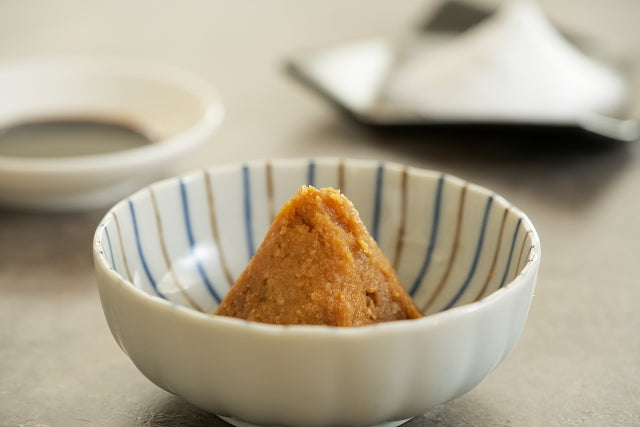A bowl of miso soup can prevent high blood pressure

The rainy season is over in no time, and hot summer days continue.
This year, many people may have plans for summer leisure such as beer gardens and festivals for the first time in a while. When you sweat a lot, you miss salty food.
Hello, this is Yukimi from MISOVATION staff. Looking at the children who are playing happily in such a hot weather, I am secretly eating cold ice cream in a cool room.
At this time of year when you crave salty taste, too much salt can lead to high blood pressure and serious illness. Miso soup also contains salt, so some people may be worried about it.
This time, I would like to introduce a slightly surprising story that actually "miso soup can prevent high blood pressure".
|
table of contents Japanese salt intake and hypertension Does eating miso soup affect blood pressure? |
Japanese salt intake and hypertension
Hypertension progresses with almost no subjective symptoms, and in the terminal stages it leads to serious illnesses such as stroke, heart disease, and kidney disease. In recent years, to prevent hypertension, salt intake standards have been gradually lowered around the world.
According to "Health Japan 21" (second edition), a guideline for promoting the health of Japanese people, the target salt intake for both men and women is 8.0g per day, but the actual average intake is 10.6g. It is It is estimated that there are about 43 million people with hypertension in Japan, and it is no exaggeration to say that hypertension is a national disease, with approximately one in three Japanese people suffering from hypertension.
Until a decade ago, miso soup, which contains salt, was sometimes avoided because it might cause hypertension. Rather, it has been proven that "the combined action of the ingredients contained in miso leads to the suppression of high blood pressure."
Does eating miso soup affect blood pressure?
A bowl of miso soup contains about 1 to 1.5 g of salt, and previously there was concern about the effect of salt in miso soup on blood pressure.
However, as a result of a study on the relationship between the frequency of miso soup intake and blood pressure levels, it was found that an increase in the number of times miso soup was consumed was not associated with an increase in blood pressure, despite an increase in salt intake.
From this, it was found that the salt contained in miso does not work effectively in terms of raising blood pressure. It has also been clarified that long-term consumption of miso soup has the effect of weakening salt sensitivity (*) in humans .
(* Blood pressure rises with increased salt intake. On the other hand, salt insensitivity has the property that blood pressure does not rise even if salt is ingested.)
Furthermore, as a result of a "long-term human intervention study" in which people drank two cups of miso soup containing 16g of miso a day for three months, it was found that ordinary miso containing dashi did not raise blood pressure, and "up to 32g of miso per day." A conclusion has also been drawn that miso intake does not raise blood pressure.
Based on these studies, it has recently been scientifically proven that daily consumption of miso soup does not affect blood pressure.
Miso soup can also prevent hypertension
Drinking miso soup not only does not affect the rise in blood pressure, but it actually has the effect of preventing high blood pressure.
An animal experiment (*2) revealed that miso contains antihypertensive factors, inhibitors of organ damage, and antioxidant activity. As a result of its function, it has been found to have an antihypertensive effect, that is, an effect to prevent hypertension.
In addition, by making miso soup with plenty of vegetables, the potassium contained in the vegetables promotes the excretion of sodium from the salt in the miso, preventing blood pressure from rising, and even lowering blood pressure. By combining vegetables with various combinations of seaweed, mushrooms, and soy products such as tofu and fried tofu, miso soup is likely to contribute to a healthy diet that prevents high blood pressure.
Unique to MISOVATION! device
As introduced so far, it is believed that the salt contained in miso does not affect the increase in blood pressure. On top of that, MISOVATION is trying to keep the salt content to 98% of the standard value so that it does not become too salty.
Instead of suppressing the salty taste, the dashi stock of dried sardines, dry dried bonito, kelp, and shiitake mushrooms is used to make it stronger, so even with less salt, it is delicious without being bland. It's unique to miso soup, which blends with various dashi soups.
In addition, MISOVATION uses a special salt-free miso that is made by fermenting soybeans without using salt (the fermented soybean food on the back of the package is actually this!). to increase the nutritional value of Of course, MISOVATION is also full of vegetables! you know.
What did you think? By drinking miso soup, it is important to invest in future physical health, including prevention of high blood pressure.
See you next time♪
References
・Health Japan 21 (Secondary) List of target items 0000166300_1.pdf (mhlw.go.jp)
・Elucidation of various functional ingredients contained in miso2010928401.pdf (affrc.go.jp)
・Mechanism of antihypertensive effect of habitual miso soup intake (*2) en (jst.go.jp)
・"Miso Encyclopedia" Atsumitsu Watanabe (Tokyodo Publishing Co., Ltd.)
・ “Miraculous fermented seasoning miso textbook” Misaki Iwaki (X-Knowledge)

